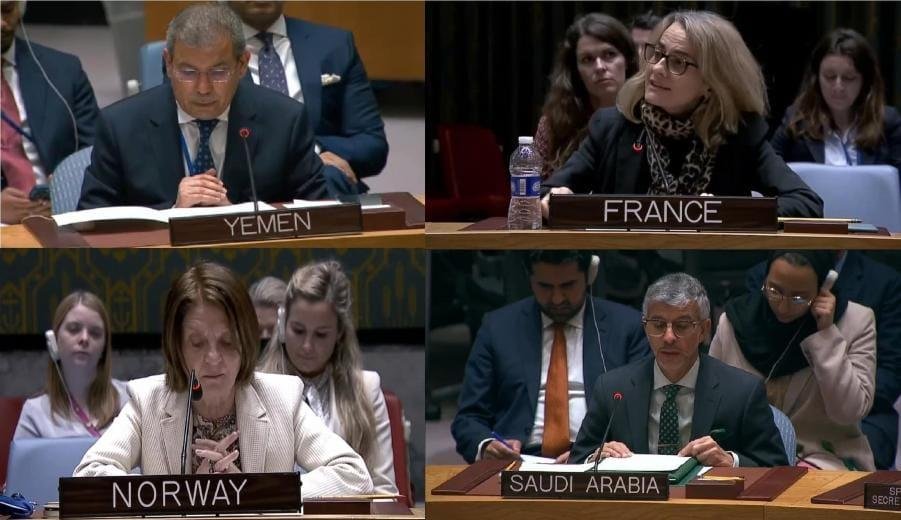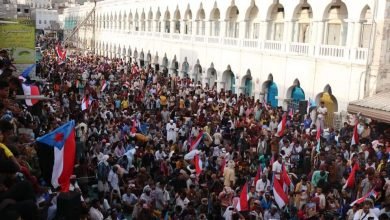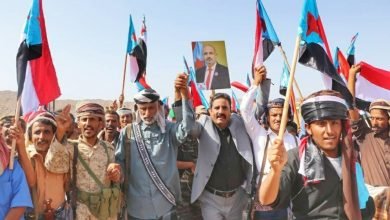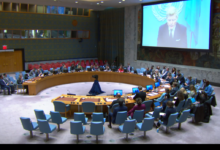Houthi Attacks Widely Condemned Aimed Warnings of War Outbreak

SMA NEWS – NEW YORK
A number of international delegates to the United Nations condemned the Houthi attacks on sea ports and oil facilities, which recently targeted the governorates of Shabwa and Hadramout in South Yemen, some countries described them as “terrorist attacks”.
This came during a special session of the Security Council on Yemen, yesterday, in which “South24 Center” virtually attended parts of the session.
The Special Envoy of the Secretary-General for Yemen told the Security Council today that the “recent attacks by the Houthi militia in two Yemeni cities risk triggering a military escalation and could further worsen a dire humanitarian situation, the Secretary-General’s Special Envoy for Yemen told the Security Council today as he called on the parties to exercise restraint and urgently agree to renew the nationwide truce that expired on 2 October.”
It was fortunate that there has not been a return to full-fledged war, said Hans Grundberg, absence of a major military escalation has facilitated his discussions with the parties and neighboring countries. Emphasizing efforts to engage the parties towards renewing the truce and aiming for a more comprehensive settlement of the conflict, he underscored the urgent need for a political process under United Nations auspices.
He noted that in “recent weeks, the Houthis, have attacked oil terminals and ports in Hadramout and Shabwa governorates to deprive the Government of its main source of revenue, namely oil exports, he pointed out. Those attacks have significant economic repercussions, undermine the welfare of all Yemenis and risk setting off a military escalation while also worsening the humanitarian situation.”
Reena Ghelani, Director of Operations and Advocacy Division, Office for the Coordination of Humanitarian Affairs (OCHA), said that “although many of the expired truce’s provisions continue to hold, people need to see improvements in their everyday lives.”
She noted that the “humanitarian Response Plan for Yemen is 55 per cent funded, she said that despite all challenges aid agencies are reaching 10.5 million people every month. Pointing to localized clashes, landmines and unexploded ordnance, and hunger and acute food insecurity, among other issues, she warned that any escalation of fighting will send humanitarian efforts back to square one.”
In the ensuing discussion, Council members echoed the Special Envoy’s calls for maximum restraint, warning that heightened tensions could lead to renewed hostilities. Voicing concern about Houthi attacks, they called on that group to remove impediments to humanitarian access and put the interests of the Yemeni people before their own.
The United States representative expressed concern that the Houthis are taking actions that run counter to strong international support for United Nations-led peace efforts. Recent Houthi attacks on commercial vessels are increasing the suffering of the Yemeni people and threatening to plunge the country back into conflict, he said, urging the Houthis to “take another path” and choose to end eight years of war.
The United Arab Emirates’ representative said that the recent “terrorist attacks” of the Houthi militia severely threaten international maritime navigation, global energy supplies and the Yemeni economy. He joined others in calling on the Houthis to remove all barriers impeding humanitarian access and to stop restricting the movement of humanitarian workers. The Council should take measures, such as sanctions, to deter the Houthis from continuing to threaten Yemen’s security.
The Russian Federation’s representative said all parties, particularly the Houthis, must demonstrate maximum restraint and work constructively with the Special Envoy. For its part, the Council must not allow the results of the truce to be erased, he said, emphasizing the need for direct contact with the Houthis to break the current deadlock, facilitate stabilization, and pave the way for a fully-fledged political process.
The representative of the Kingdom of Saudi Arabia emphasized the need to curb the humanitarian arm of the Houthi militia, he said the Houthis must be classified as a terrorist group. Reaffirming his country’s right to defend itself, he said it will respond firmly to threats to Gulf countries.
The Saudi representative said that the situation is very dangerous and on the verge of collapse. He denounced the justification of some international parties for the Houthis’ practices and condoning their actions.
The representative of Saudi Arabia said that the Houthis set three conditions for their acceptance to extend the truce, that the Arab Coalition pay all the salaries of its fighters, and that this be in hard currency (dollars), as well as to ensure that resource revenues flow into a bank account under their control.
The Saudi delegate’s speech confirmed the reports published by “South24 Center” earlier on Saudi offers to the Houthis, through the Sultanate of Oman, which included paying salaries of all state employees affiliated with the Yemeni government and under the control of the Houthis.
The offer included “paying the salaries of government employees and the Houthis in an amount exceeding 150 million USD per month. The Houthis rejected the Saudi offer, and submitted a response to it through Muscat. The senior Gulf source indicated that this offer was made without the knowledge of the Yemeni government, and without notifying it.” The Yemeni government has yet to comment on the matter.
Apparently, the unilateral Saudi offers annoyed the UN Special Envoy Hans Grundberg. In his speech, he stressed that a “durable solutions could only be reached in the context of a comprehensive settlement of the conflict”.
At the Security Council session on Tuesday, Yemen representative said that the “international community must recognize the Houthi militia as a terrorist organization, rather than merely condemn their terrorist attacks. While optimism prevailed among the Yemeni people after eight years of war, their hopes dissipated when the terrorist Houthi militia, supported by Iran, chose escalation and refused to renew the truce. Nonetheless, the Presidential Leadership Council remains committed to the truce and respects it today,” he said.
For his part, Kenya’s delegate, Swabri Ali Abbas, condemned “the Houthis’ disruptive acts, including on civilian infrastructure, which violate international humanitarian law and heighten tensions and could lead to renewed hostilities.” “The Houthis should realize that those who are suffering most are innocent Yemenis, the most vulnerable being women, children and people with disabilities,” he added. He said that the “interception of a Yemen-bound vessel smuggling ammonium suggests that Yemen could be a base to destabilize the region, he said, calling for an investigation.”
China’s delegate, Zhang Jun, called on the parties to the conflict, especially the Houthis, to put the interests of the Yemeni people first, remain committed to the path of political settlement and ease tensions on the ground as soon as possible.
The delegate of Gabon, Edwige Koumby Missambo, recent drone attacks on the oil ports of Al Dhabah in Hadramaut governorate and the port of Qena in the south of the country in Shabwa, said those attacks, if not neutralized as soon as possible, could draw the country into a conflict worse than the previous one.
France’s delegate, Nathalie Broadhurst Estival, called on the Houthis to “abstain from any provocation, which could again cast Yemen into a new cycle of violence. She condemned the recent terrorist attacks by the Houthis on oil terminals in Hadramout and Shabwa, which aimed to suffocate the Yemeni Government’s economy.”
Commenting on this, senior Houthi official Hussein al-Ezzi who occupies the so-called “Deputy Minister of Foreign Affairs” in the Sanaa government, described the countries’ condemnations of the Houthis attacks on ports as “insolence.”







